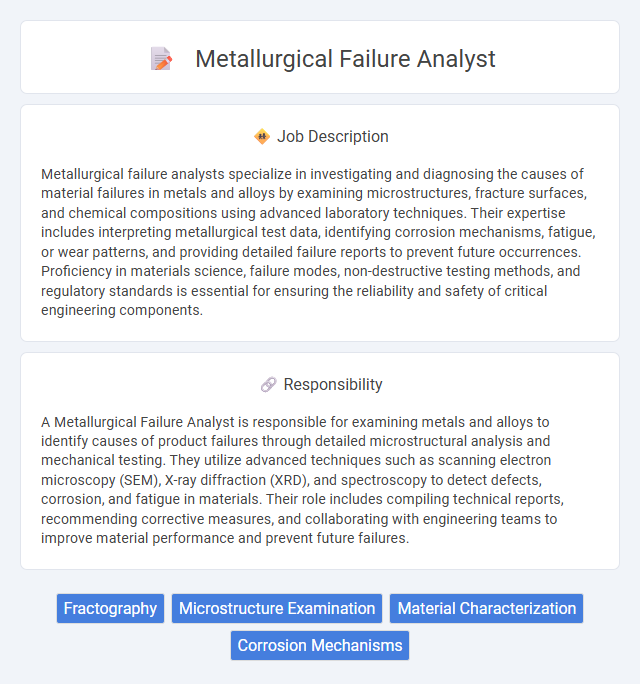
Metallurgical failure analysts specialize in investigating and diagnosing the causes of material failures in metals and alloys by examining microstructures, fracture surfaces, and chemical compositions using advanced laboratory techniques. Their expertise includes interpreting metallurgical test data, identifying corrosion mechanisms, fatigue, or wear patterns, and providing detailed failure reports to prevent future occurrences. Proficiency in materials science, failure modes, non-destructive testing methods, and regulatory standards is essential for ensuring the reliability and safety of critical engineering components.
Individuals with strong analytical skills and a keen attention to detail are likely suitable for a metallurgical failure analyst role, as the job demands precise examination of material defects. Those comfortable working with technical data and laboratory equipment might probably find this career fulfilling. However, people who prefer less technical or hands-on tasks may not be well-matched with the responsibilities of this position.
Qualification
A Metallurgical Failure Analyst must possess a strong foundation in materials science or metallurgical engineering, typically holding a bachelor's degree or higher in these fields. Proficiency in advanced analytical techniques such as scanning electron microscopy (SEM), X-ray diffraction (XRD), and mechanical testing is essential for diagnosing material failures. Experience with root cause analysis and failure mode identification in industrial contexts enhances the ability to prevent future metallurgical defects effectively.
Responsibility
A Metallurgical Failure Analyst is responsible for examining metals and alloys to identify causes of product failures through detailed microstructural analysis and mechanical testing. They utilize advanced techniques such as scanning electron microscopy (SEM), X-ray diffraction (XRD), and spectroscopy to detect defects, corrosion, and fatigue in materials. Their role includes compiling technical reports, recommending corrective measures, and collaborating with engineering teams to improve material performance and prevent future failures.
Benefit
Metallurgical failure analysts are likely to benefit from strong demand in industries such as aerospace, automotive, and manufacturing where material integrity is critical. The role probably offers opportunities for professional growth and specialization due to the complexity of failure investigation techniques. They might also enjoy the advantage of contributing to safety improvements and cost savings by identifying material defects and preventing future failures.
Challenge
Metallurgical failure analysts likely encounter complex challenges involving the identification of root causes of material failures in diverse environments, requiring deep expertise in material science and engineering principles. They probably face difficulties in interpreting microstructural data and performing accurate failure mode analysis under tight deadlines, which demands precision and critical thinking. The complexity of correlating failure mechanisms with operational conditions suggests these professionals must stay updated with advanced testing techniques to provide reliable and actionable insights.
Career Advancement
A Metallurgical Failure Analyst specializes in investigating material failures to improve product durability and safety, offering a crucial role in quality assurance and engineering sectors. Career advancement often leads to senior analyst positions, management roles in failure analysis teams, or specialized consultancy opportunities within aerospace, automotive, and manufacturing industries. Developing expertise in advanced techniques such as scanning electron microscopy (SEM) and finite element analysis (FEA) enhances prospects for leadership and research and development positions.
Key Terms
Fractography
Metallurgical failure analysts specializing in fractography examine fracture surfaces to determine the root causes of metal failures in components and structures. They utilize advanced imaging techniques such as scanning electron microscopy (SEM) to identify fracture modes, crack initiation sites, and propagation patterns in metals and alloys. Detailed fractographic analysis helps optimize material selection, improve manufacturing processes, and prevent future failures in aerospace, automotive, and industrial applications.
Microstructure Examination
Metallurgical failure analysts specialize in microstructure examination to identify the root causes of material failures by analyzing grain size, phase distribution, and defects using optical microscopy, scanning electron microscopy, and X-ray diffraction techniques. Detailed microstructural analysis enables the detection of cracks, inclusions, corrosion, and other anomalies that compromise the integrity of metals and alloys in engineering components. This expertise supports failure prevention and material performance optimization in industries such as aerospace, automotive, and manufacturing.
Material Characterization
A Metallurgical Failure Analyst specializing in Material Characterization utilizes advanced techniques such as scanning electron microscopy (SEM), X-ray diffraction (XRD), and energy dispersive spectroscopy (EDS) to identify failure modes in metals and alloys. This role involves conducting microstructural analysis and mechanical testing to determine root causes of fractures, corrosion, or wear in industrial components. Expertise in interpreting metallurgical data enables the development of corrective actions that enhance material performance and reliability in manufacturing processes.
Corrosion Mechanisms
A Metallurgical Failure Analyst specializing in Corrosion Mechanisms investigates the causes and progression of material degradation in metals due to chemical or electrochemical reactions with their environment. Utilizing advanced techniques such as scanning electron microscopy (SEM), energy-dispersive X-ray spectroscopy (EDX), and electrochemical corrosion testing, the analyst identifies pitting, stress corrosion cracking, and galvanic corrosion phenomena. This expertise supports failure prevention strategies, material selection, and maintenance planning in industries like oil and gas, aerospace, and construction.
 kuljobs.com
kuljobs.com